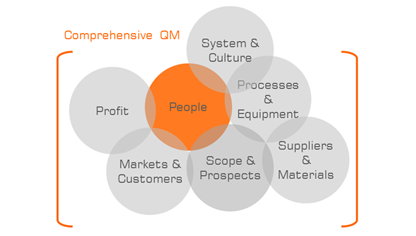| |
|
|
 Why quality management and psychology?
Why quality management and psychology?
The current quality management standards increasingly take into account people and their interactions, as quality-relevant parameters. The standard DIN EN ISO 9001:2015 (Quality management systems - Requirements) regards social, psychological and physical aspects as process environment [Chapter 7.1.4], and furthermore refers to leadership [Chapter 5], consciousness of the personnel [Chapter 7.3], as well as internal and external communication [Chapter 7.4]. Likewise, the standard DIN EN ISO 13485:2016 (Medical devices - Quality management systems - Requirements for regulatory purposes) explicitly names communication and quality consciousness as important elements of the quality management system:
- Consciousness of regulatory requirements, quality consciousness of personnel [Chapter 5.5.2; 6.2]
- Communication within the organization [Chapter 5.5.3]
- Communication with customers [Chapter 7.2.3]
- Communication with regulatory authorities [Chapter 7.2.3]
Consciousness and communication are central concepts of cognitive psychology, whereas leadership and employee motivation are topics of the applied work and organizational psychology. Audit psychology is also an example of the very close link between quality management and psychology (cp. DIN EN ISO 19011:2011, Chapter 7): In numerous FDA inspections, I have experienced how social interaction and communication, at comparable "technical GxP compliance", have influenced the number of 483 annotations. In successful (comprehensive) quality management systems, the socio-cultural aspects must also be considered, i.e., the "psychology" of the stakeholders.
Figure: Technical and comprehensive Quality Management (mouse-over)
"In my estimation, the most influential variables
in a quality management system are people.
They can even override the impact of technical parameters,
such as documentation, processes or starting material."
